7th Street/Metro Center station
7th Street/Metro Center station is an underground light rail and rapid transit (known locally as a subway) station on the A, B, D, and E lines of the Los Angeles Metro Rail system. The station also has street level stops for the J Line of the Los Angeles Metro Busway system. The station is located under 7th Street, after which the station is named, at its intersections with Figueroa, Flower and Hope Streets.[2]
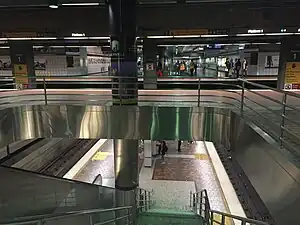 The tracks for the A and E Lines cross over the tracks for the B and D Lines | |||||||||||||||||||||||||||||||||||
| General information | |||||||||||||||||||||||||||||||||||
| Other names | 7th Street/Metro Center/Julian Dixon | ||||||||||||||||||||||||||||||||||
| Location | 660 South Figueroa Street Los Angeles, California | ||||||||||||||||||||||||||||||||||
| Coordinates | 34.0487°N 118.2587°W | ||||||||||||||||||||||||||||||||||
| Owned by | Los Angeles County Metropolitan Transportation Authority | ||||||||||||||||||||||||||||||||||
| Platforms | 2 side platforms (light rail) 1 island platform (subway) | ||||||||||||||||||||||||||||||||||
| Tracks | 4 | ||||||||||||||||||||||||||||||||||
| Connections | See Connections section | ||||||||||||||||||||||||||||||||||
| Construction | |||||||||||||||||||||||||||||||||||
| Structure type | Underground | ||||||||||||||||||||||||||||||||||
| Parking | Paid parking nearby | ||||||||||||||||||||||||||||||||||
| Bicycle facilities | Metro Bike Share station[1] | ||||||||||||||||||||||||||||||||||
| Accessible | Yes | ||||||||||||||||||||||||||||||||||
| History | |||||||||||||||||||||||||||||||||||
| Opened | February 15, 1991 | ||||||||||||||||||||||||||||||||||
| Services | |||||||||||||||||||||||||||||||||||
| |||||||||||||||||||||||||||||||||||
| Location | |||||||||||||||||||||||||||||||||||
It is officially named 7th Street/Metro Center/Julian Dixon station after former U.S. Rep. Julian Dixon, who had a pivotal role in obtaining the federal funding that enabled construction of the Metro Rail system.[3]
History
7th Street/Metro Center was constructed by the Southern California Rapid Transit District, which later became part of today's LA Metro, as part of the first 4.5-mile (7.2 km) minimum operating segment (MOS-1) of the Metro Rail subway (now B Line). Ground was broken for the project on September 29, 1986.[4]
The upper level of this station, used by light rail trains, opened on February 15, 1991,[5] nearly two years before the rest of the MOS-1 subway stations. However, the opening was several months after the rest of the Blue Line's (now A Line) stations.[6] The lower level subway platform opened with the rest of the MOS-1 segment stations on January 30, 1993.[7]
Metro spent nearly $2 million worth of enhancements to 7th Street/Metro Center station as part of the Expo Line project, which was completed weeks before the Expo Line (now E Line) began service to La Cienega/Jefferson station. These enhancements included a new dispatch booth and improved signage in the station.[8]
The station served as the northern and eastern terminus for the A Line and E Line, respectively. Both lines were extended on June 16, 2023 as part of the Regional Connector Transit Project.
Service
Station layout
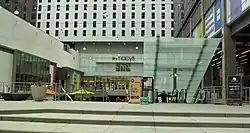
The station was the first underground station in the Metro system, and consists of three underground levels. The main concourse is on the first level down, the light rail side platforms are on the second level down, while the heavy rail island platform is on the third level down. A small first level mezzanine connects the light rail side platforms. The Metro Silver Line stops at the street level next to the station's entrances. The station has direct access to The Bloc Shopping Mall (formerly known as Broadway/Macy's Plaza) with a pedestrian-friendly entrance from the mall directly to the subway station.
This is one of only two stations in the entire system that has underground side platforms, the other being the Wilshire/Vermont station.
| G | Street level | Entrances/Exits |
| Figueroa St/7th St (Northbound) | ← | |
| Flower St/7th St (Southbound) | | |
| B1 | North mezzanine | Faregates, ticket machines, to 7th St & Flower St Walkway between Platform 1 and Platform 2 |
| B2 | East mezzanine | Faregates, ticket machines, to 7th St & Hope St, access to The Bloc |
| Side platform, doors will open on the right | ||
| Platform 1 (Northbound/Eastbound) | ← ← | |
| Platform 2 (Southbound/Westbound) | | |
| Side platform, doors will open on the right | ||
| West mezzanine | Faregates, ticket machines, to 7th St & Figueroa St | |
| B3 | Platform 3 (Northbound/Westbound) | ← ← |
| Island platform, doors will open on the left | ||
| Platform 4 (Eastbound) | | |
Hours and frequency
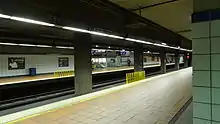
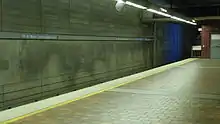
A Line trains run every day between approximately 4:30 a.m. and 11:30 p.m. Trains operate every 10 minutes during peak hours Monday through Friday, and every twelve minutes during the daytime on weekdays and all day on the weekends. Evening service (after 7 p.m.) is every 20 minutes.[9]
B Line trains run every day between approximately 4:30 a.m. and midnight, while D Line trains run every day between approximately 5 a.m. and midnight. Towards North Hollywood or Wilshire/Western, trains operate every ten minutes during peak hours Monday through Friday, every twelve minutes during the daytime on weekdays. On weekends, trains run all day after approximately 10 a.m., with a 15-minute headway early Saturday and Sunday mornings. Night service is every 20 minutes. Towards Union Station, trains operate every five minutes during peak hours Monday through Friday, every six minutes during the daytime on weekdays, and all day on the weekends after approximately 10 a.m., with a 7.5-minute headway early Saturday and Sunday mornings. Night service is every 10 minutes.[10]
E Line trains run every day between approximately 4:30 a.m. and 11:30 p.m. Trains operate every 10 minutes during peak hours Monday through Friday, and every twelve minutes during the daytime on weekdays and all day on the weekends. Evening service (after 7 p.m.) is every 20 minutes.[11]
J Line buses run 24 hours a day between El Monte Station, Downtown Los Angeles, and the Harbor Gateway Transit Center as route 910, with some trips continuing on to San Pedro between 6 a.m. and 8 p.m. and signed as Route 950. On weekdays, buses operate every four to ten minutes during peak hours, with longer headways of 15 minutes during the daytime, 20 minutes during evenings, 40 minutes during nights and every hour overnight. On weekends, buses arrive every 20 minutes most of the day, with longer headways of 40 minutes during nights and every hour overnight.[12]
Connections
In addition to the rail and busway services, 7th Street/Metro Center station is a major hub for municipal bus lines. As of June 16, 2023, the following connections are available:[13]
- Los Angeles Metro Bus: 14, 16, 18, 20, 37, 51, 53, 55, 60, 62, 66, 70, 76, 78, 81, Express 460, Express 487, Express 489*, Rapid 720
- Antelope Valley Transit Authority: 785*
- Big Blue Bus (Santa Monica): Rapid 10*
- City of Santa Clarita Transit: 799*
- Foothill Transit: Silver Streak, 490*, 493*, 495*, 497*, 498*, 499*, 699*
- LADOT Commuter Express: 409*, 422*, 423*, 431*, 437*, 438*, 448*, 534*
- LADOT DASH: A, B, E, F
- Montebello Bus Lines: 40, 50, 90 Express*
- Torrance Transit: 4X*
Note: * indicates commuter service that operates only during weekday rush hours.
As a filming location
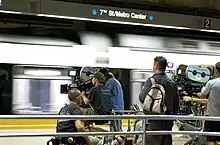
Due to the design of the station and the popularity of the film industry in Los Angeles, the station has been featured in various movies and music videos over the years
Music Videos
- The Weeknd - After Hours (Short Film) (2020) [15]
- Taylor Swift - Delicate (2018)
- Lonely Day - System of A Down (2006)
- What It's Like - Everlast (1998)
References
- "Station Map". Metro Bike Share. January 27, 2015. Archived from the original on January 2, 2022. Retrieved November 13, 2021.
- "7th St/Metro Center Connections" (PDF). Metro. Archived from the original (PDF) on February 25, 2012. Retrieved November 18, 2021.
- Jager, Rick (August 2, 2001). "MTA Unveils Plaque Honoring Late Congressman Julian Dixon" (PDF). MyMetro (employee news digest). Archived (PDF) from the original on August 6, 2012 – via Dorothy Peyton Gray Transportation Library and Archive.
- "25 Years Ago Today: Los Angeles' Red Line Subway Breaks Ground". Dorothy Peyton Gray Transportation Library and Archive. September 29, 2011. Archived from the original on November 14, 2021. Retrieved November 14, 2021.
- "Underground Opening". The Los Angeles Times. February 15, 1991. p. A3. Archived from the original on March 23, 2023. Retrieved December 14, 2022 – via Newspapers.com.

- Taylor, Ronald B. (January 17, 1991). "Blue Line's Ridership, Safety Praised After Initial 6 Months : Transit: Officials say 18,000 commuters daily use the trains, three times the number expected. Crime is low; accidents with cars and pedestrians are main problem". Los Angeles Times. Archived from the original on November 18, 2021. Retrieved November 18, 2021.
- Katches, Mark (January 31, 1993). "Red Line Rolls to Raves – It's Smooth Railing As L.A. Subway Opens". Los Angeles Daily News.
- "Project: Exposition Light Rail Transit Project – Phase 1" (PDF). Los Angeles County Metropolitan Transportation Authority. July 15, 2010. Archived from the original (PDF) on June 29, 2011. Retrieved September 7, 2010.
- "Metro A Line schedule". Los Angeles County Metropolitan Transportation Authority. June 16, 2023. Retrieved June 12, 2023.
- "Metro B Line/D Line schedule". Los Angeles County Metropolitan Transportation Authority. September 12, 2021. Retrieved November 13, 2021.
- "Metro E Line schedule". Los Angeles County Metropolitan Transportation Authority. June 16, 2023. Retrieved June 12, 2023.
- "Metro J Line schedule". Los Angeles County Metropolitan Transportation Authority. September 12, 2021. Retrieved November 13, 2021.
- "E Line Timetable – Connections section" (PDF). Los Angeles County Metropolitan Transportation Authority. June 16, 2023. p. 2. Retrieved June 26, 2023.
- "7th street Metro film Location". Archived from the original on September 20, 2022. Retrieved September 17, 2022.
- "The Weeknd: After Hours (Short 2020) - Filming & production - IMDb". IMDb.
External links
- Station connections overview Archived February 25, 2012, at the Wayback Machine
- OpenStreetMap relation for the station
